
NAIS-Native American and Indigenous Studies Association
Scope & Guideline
Empowering Indigenous Scholarship for a Changing World
Introduction
Aims and Scopes
- Indigenous Histories and Narratives:
The journal emphasizes the importance of documenting and analyzing Indigenous histories, focusing on various time periods and geographical contexts. This includes examining the legacies of colonialism and the ongoing impact of historical events on contemporary Indigenous communities. - Cultural Practices and Expressions:
A core area of research involves exploring Indigenous cultural practices, including art, performance, and literature. The journal encourages studies that highlight how these expressions serve as forms of resistance, resilience, and identity for Indigenous peoples. - Environmental and Land Relations:
The journal addresses the intricate relationships between Indigenous communities and their environments. It explores themes of land sovereignty, ecological knowledge, and the impacts of environmental change on Indigenous ways of life. - Indigenous Governance and Agency:
Research focusing on Indigenous governance systems, political activism, and agency is prominently featured. The journal invites contributions that examine how Indigenous nations navigate contemporary political landscapes and assert their rights. - Decolonization and Social Justice:
The journal promotes scholarship that engages with decolonization efforts and social justice movements. It seeks to amplify Indigenous perspectives on issues of rights, recognition, and reparative justice.
Trending and Emerging
- Indigenous Data Sovereignty:
There is a growing emphasis on Indigenous data sovereignty, exploring how Indigenous communities can control their data and narratives. This theme is critical as it intersects with issues of privacy, representation, and rights in the digital age. - Environmental Justice and Climate Activism:
Research focusing on Indigenous environmental justice and activism in response to climate change is on the rise. This emerging scope highlights the critical role Indigenous knowledge plays in addressing ecological crises. - Intersectionality in Indigenous Studies:
There is an increasing trend towards intersectional analyses that consider how race, gender, class, and other identities intersect within Indigenous contexts. This approach enriches the understanding of Indigenous experiences and activism. - Indigenous Futurism and Speculative Narratives:
Emerging scholarship in the realm of Indigenous futurism explores speculative narratives that envision Indigenous futures and challenge colonial imaginaries. This theme reflects a creative and proactive engagement with the future. - Global Indigenous Networks and Solidarity:
Recent publications are emphasizing the connections between Indigenous groups globally, highlighting collaborative movements that transcend national borders. This trend showcases the solidarity and shared struggles of Indigenous peoples worldwide.
Declining or Waning
- Traditional Anthropological Approaches:
There is a noticeable decline in research that applies traditional anthropological frameworks without integrating Indigenous methodologies or perspectives. This shift indicates a move towards more Indigenous-centered approaches in scholarship. - Historical Settler Colonial Studies:
While historical analyses of settler colonialism remain relevant, there is a waning focus on purely historical narratives without contemporary connections. Scholars are increasingly seeking to link past injustices with current Indigenous struggles. - Focus on Pan-Indigenous Identity:
The journal has seen a reduction in articles that generalize Indigenous experiences across different nations and cultures. There is a growing emphasis on the specificity of individual tribal histories and contemporary issues. - Solely Literary Criticism:
Research that focuses exclusively on literary criticism without contextualizing Indigenous literature within broader social, political, and cultural frameworks is becoming less common. The journal now favors interdisciplinary approaches that connect literature with lived experiences.
Similar Journals

CONTEMPORARY PACIFIC
Navigating the Intersections of Culture and Politics in the PacificCONTEMPORARY PACIFIC is a prestigious academic journal published by University of Hawaii Press, focusing on interdisciplinary studies within the realms of Geography, Sociology, and Political Science. Since its inception in 1992 and continuing through to 2023, the journal has been a vital platform for researchers and scholars aiming to explore the dynamic and multifaceted issues facing the Pacific region. With an impact factor that places it within the Q3 category for both Geography, Planning and Development, and Sociology and Political Science, it holds an essential role in contributing to the scholarly discourse in these fields. The journal is indexed in Scopus, with rankings that reflect its ongoing relevance and contribution, boasting a 55th percentile rank in Sociology and Political Science and a 39th percentile in Geography, Planning and Development. Although it does not offer Open Access options, the journal remains an invaluable resource for those dedicated to understanding the complex narratives of the Pacific, providing a rich tapestry of articles that are both insightful and impactful for researchers, professionals, and students alike.

Revista Espanola de Antropologia Americana
Championing Original Research in Cultural FrameworksRevista Española de Antropología Americana, published by UNIV COMPLUTENSE MADRID, SERVICIO PUBLICACIONES, stands as a significant contribution to the field of anthropology, particularly focusing on American societies and cultures. Since its inception in 1970, this journal has evolved, with issues currently being published until 2024, providing a platform for original research, reviews, and scholarly discourse. Despite being a Q3 category journal in the 2023 rankings, it plays a pivotal role in disseminating knowledge and stimulating academic debate within the anthropology community. With an ISSN of 0556-6533 and an E-ISSN of 1988-2718, Revista Española de Antropología Americana strives to engage researchers, professionals, and students with insightful content that reflects the dynamic nature of cultural studies. Although it operates under traditional access models, the rich array of topics covered ensures its relevance to ongoing scholarly conversation in social sciences and anthropology. Addressing a diverse array of anthropological themes, this journal is essential for anyone looking to deepen their understanding of the cultural frameworks shaping American societies.

E-Latina-Revista Electronica de Estudios Latinoamericanos
Uncovering Insights into the Dynamics of Latin American LifeE-Latina-Revista Electronica de Estudios Latinoamericanos is a premier open-access journal dedicated to the interdisciplinary study of Latin American culture, society, and politics. Published by the Facultad de Ciencias Sociales at the Universidad de Buenos Aires, this journal aims to provide a platform for the dissemination of high-quality research, facilitating an exchange of ideas among scholars, practitioners, and students alike since its inception in 2013. With its commitment to accessibility, E-Latina makes significant contributions to the understanding of contemporary Latin American issues, inviting contributions from a diverse range of academic fields. Its open-access model not only enhances readership but also ensures that vital knowledge reaches a global audience, thereby promoting scholarly dialogue and collaboration. Researchers interested in the dynamic and evolving landscape of Latin America will find a wealth of research and insights that reflect the complexities of the region in this esteemed publication.
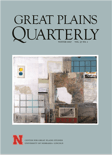
GREAT PLAINS QUARTERLY
Exploring the Heart of the PlainsGreat Plains Quarterly is a distinguished academic journal published by the Center for Great Plains Studies at the University of Nebraska-Lincoln. This esteemed journal, with an ISSN of 0275-7664 and an E-ISSN of 2333-5092, has been a prominent platform for fostering scholarly dialogue on the cultural, historical, and environmental dynamics of the Great Plains region since its inception in 1983, with publication resuming in 1995. Although it is categorized in the Q4 quartile of Arts and Humanities (miscellaneous) for 2023, its contributions are essential for researchers, professionals, and students interested in regional studies, interdisciplinary approaches, and the unique narratives that shape the Great Plains. While the journal is not open access, it provides critical insights into the evolution of the area's socio-cultural landscapes, making it a valuable resource for those engaged in the ongoing exploration of the Great Plains and beyond.

PACIFIC NORTHWEST QUARTERLY
Cultivating Understanding Through Cultural and Historical InsightsPACIFIC NORTHWEST QUARTERLY is an esteemed academic journal published by the University of Washington, dedicated to advancing scholarship in Cultural Studies and History as they pertain to the unique context of the Pacific Northwest region of the United States. With an ISSN of 0030-8803 and an E-ISSN of 2327-9753, the journal has maintained a consistent publication record since its inception, publishing critical research that often bridges gaps between historical narratives and contemporary cultural discourse. Although it has recently been categorized in the fourth quartile within its respective fields, the journal serves as a platform for underrepresented voices and lesser-known histories, thereby enriching the academic landscape. Researchers, professionals, and students alike will find valuable insights and scholarly debates that contribute to a deeper understanding of the Pacific Northwest's past and its ongoing cultural evolution. The journal offers traditional subscription-based access, fostering a community of meaningful engagement and inquiry among its readership.
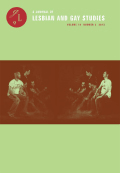
GLQ-A JOURNAL OF LESBIAN AND GAY STUDIES
Challenging conventions in the study of queer lives.GLQ: A Journal of Lesbian and Gay Studies, published by Duke University Press, is a pioneering academic journal that has made significant contributions to the critical discourse around LGBTQ+ issues since its inception in 1996. With an ISSN of 1064-2684 and an E-ISSN of 1527-9375, this esteemed publication engages a wide audience of researchers, professionals, and students in cultural studies, gender studies, and queer theory. Ranked in Q2 for Cultural Studies and Q3 for Gender Studies in 2023, GLQ is recognized for its rigorous scholarship and innovative approaches to the study of sexuality and identity. The journal offers an invaluable platform for interdisciplinary dialogue, exploring the complexities of LGBTQ+ lives, cultures, and movements. Although not open access, GLQ remains a vital resource for those looking to stay at the forefront of scholarship in these dynamic fields. Whether you are a seasoned researcher or a newcomer to queer studies, GLQ provides essential insights and fosters ongoing conversations that challenge and expand our understanding of sexuality and gender.
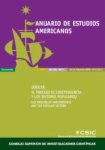
Anuario de Estudios Americanos
Bridging Cultures: A Scholarly Journey Through American StudiesAnuario de Estudios Americanos is a prestigious journal published by the Consejo Superior Investigaciones Cientificas (CSIC), focusing on the multifaceted dimensions of American studies. With an ISSN of 0210-5810 and an E-ISSN of 1988-4273, this Open Access journal has made its scholarly contributions freely accessible to researchers and enthusiasts alike since 1994, thus fostering international dialogue in the field. Based in Spain, the journal holds a commendable status, ranking in the Q2 category for both Cultural Studies and History as of 2023, which underscores its significance in these academic realms. Additionally, its Scopus rankings of #653/1760 in Arts and Humanities and #633/1304 in Social Sciences highlight its competitive standing among global publications. Anuario de Estudios Americanos aims to promote scholarly discourse and research on the historical, cultural, and social dimensions of the Americas, making it an essential resource for researchers, professionals, and students dedicated to exploring this dynamic area of study.

ACADIENSIS
Exploring Atlantic Canada's Rich Historical Tapestry.ACADIENSIS, a prominent academic journal published by the University of New Brunswick, serves as a vital resource in the field of history, particularly focusing on the unique narratives and historiographical developments within the Atlantic Canadian context. With an ISSN of 0044-5851 and an E-ISSN of 1712-7432, this journal offers a platform for both emerging and established scholars to disseminate their research, contributing to the rich tapestry of historical scholarship. Despite its Q3 ranking in the history category as of 2023 and a Scopus rank of 969 out of 1760, the journal's emphasis on regional history allows for a profound exploration of local narratives, enhancing the broader understanding of Canadian heritage. Situated at the Department of History in Fredericton, New Brunswick, Canada, ACADIENSIS encourages interdisciplinary dialogue and offers a range of insights into themes of identity, culture, and social change, making it an indispensable resource for researchers, professionals, and students alike seeking to deepen their understanding of historical perspectives.
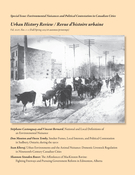
URBAN HISTORY REVIEW-REVUE D HISTOIRE URBAINE
Advancing Knowledge at the Crossroads of History and UrbanismURBAN HISTORY REVIEW - REVUE D'HISTOIRE URBAINE, published by University of Toronto Press Inc., serves as a vital scholarly resource in the intersection of history and urban studies, focusing on the evolution of urban life and spaces. Established in 1978 and publishing continuously until 2012, and then resuming in 2014, this journal reflects on urban historical perspectives and contemporary urban issues, making significant contributions to both fields. With an impressive Q2 ranking in History and a Q4 ranking in Urban Studies as of 2023, the journal is positioned to attract a diverse readership of researchers, practitioners, and students alike. While currently not an open-access journal, it maintains a reputation for rigorous scholarship, encouraging the exploration of urban narratives that shape our understanding of cities today. For those invested in the past's lessons for future urban development, this journal is indispensable in navigating the complexities of urban history.
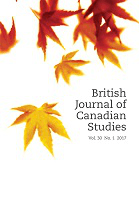
British Journal of Canadian Studies
Advancing Scholarly Conversations on Canadian StudiesThe British Journal of Canadian Studies, published by Liverpool University Press, serves as a vital platform for the exploration and dissemination of scholarly research related to Canadian studies, spanning the domains of cultural studies, history, literature and literary theory, and sociology and political science. Despite its Q4 ranking across multiple categories in the 2023 journal metrics, it offers a unique perspective on Canadian issues and engages with contemporary debates in these fields, making it a valuable resource for researchers, professionals, and students alike. By facilitating discussions that connect various disciplines, this journal encourages interdisciplinary inquiries and cross-cultural comparisons that enrich the understanding of Canada in a global context. Although the journal is not open access, it is poised to make a significant contribution to scholarship in these areas from its base in the United Kingdom.